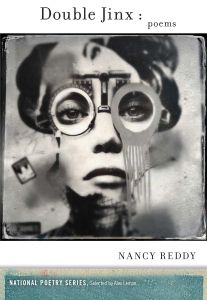National Poetry Month: Guest Post from Nancy Reddy: Finding Humor in the Poetic:
During my MFA, I was lucky enough to work with the poet Ronald Wallace, who is truly the kindest soul I ever hope to meet. Really, though – before we’d met, he sent me an email with comments on my work so nice that I showed it to my husband and asked, “Do you think he’s somehow making fun of me?” He wrote meticulous pencil notes on the poems that I brought to him, and he made copies of those comments for his own reference so that he could compare revisions.

Milkweed Editions, September 2015.
And so it was a surprise when, after handing him the first big pile of poems that eventually became my thesis, he looked up and said simply, “not much funny here.”
Funny? I’d had no idea that poems could be funny – certainly not outside of Shel Silverstein or nursery rhymes. And besides, I’d first started writing poems as a teenager because I had Feelings, and those feelings were Not Funny. The poets I loved most then were Louise Glück, Carl Phillips, Larry Levis – poets of lyric density and heartbreaking revelation. Not much funny there, either.
But I trusted Ron’s (gentle) suggestion, and I started trying to lighten up a bit in my writing, beginning the only way I knew how – with books. Ron’s poetry funny isn’t necessarily mine, though he does have lovely poems about, for example, explaining to his young daughter where babies come from that manage to merge the humorous with the touching.
I found two poets, though, who helped me learn how to stop taking myself so seriously – and to do it without losing the intensity and urgency that brings me to poetry in the first place. Matthea Harvey’s MODERN LIFE is populated by robots and mermaids and fish, and it veers wildly – thrillingly – from quirky to heartbreaking. While the first poem, “Implications for Modern Life,” isn’t exactly funny, it does have moments of sharp, surreal description, beginning with its opening sentence: “The ham flowers have veins and are rimmed in rind, each petal a little meat sunset.” I find those ham flowers simultaneously gripping, horrifying, and tremendously moving. I don’t think, before reading that poem, that I’d had any idea poems could do that – that they could render a world so strange and yet so compelling.
Catherine Pierce’s THE GIRLS OF PECULIAR, on the other hand, brought me a world so familiar I still feel I might have written some of those poems, if she hadn’t gotten there first. (This is wishful thinking.) “Oregon Trail, 5th Grade” pitches an astute player of that game against her less-strategic classmates: “The other kids / are idiots, loading up on clothes and corn, /but you know the trick: ammo, oxen, and luck.” This speaker is merciless and acerbic when the video-children die, noting with some satisfaction a player’s death to typhoid: “You fill out the grave, guiltless, gleeful: / Here lies Clara, a proper fool. Typhoid sounds to you / like a windstorm, like dumb Clara died when her heart / thrashed too hard against the limbs of her ribs.”
Now, Ron might still remark that there’s not much funny in all this, and perhaps he’d be right. But those poets taught me about tonal range – that I could bring in parts of my world beyond the snow and bare trees and solitude that obsessed me at the time, that I could move beyond the melancholy that had become, somehow, my default tone.
This gentle prodding from Ron helped me to write all kinds of things I wouldn’t have otherwise – poems about beauty queens, Snow White, Chicken Little, Little Red Riding Hood, vampires. Some worked. Some, not so much. (Chicken Little never quite got off the ground, alas.) And along the way I’ve learned something about being at least a little bit funny in my poems. The title poem to my forthcoming poem, Double Jinx (http://milkweed.org/shop/product/376/), owes a great debt to that one comment from Ron. Its full title is “The Case of the Double Jinx,” and it takes up Nancy Drew, her many disguises, adventures, and misadventures. It begins with two lines that often get a laugh at readings:
You’re Nancy Drew and you drive a blue coupe.
You drive fast. Your mother is dead.
I’m not sure if that’s the kind of funny Ron had in mind, but I wouldn’t have written it without that push. My book is much weirder and wilder – funnier in places, but darker, too (poor Ned ends up on an ill-fated Alpine ski trip, bound and gagged in the basement of an inn; the poem ends with Nancy ultimately asking wondering if “she’s the real Nancy / and you’re a costume party”) – for that encouragement.

Nancy Reddy.
Nancy Reddy‘s poems have been published in 32 Poems, Tupelo Quarterly, and Best New Poets of 2011 (selected by D.A. Powell), with poems forthcoming in Post Road and New Poetry from the Midwest. She holds an M.F.A. from the University of Wisconsin, where she is currently a doctoral candidate in composition and rhetoric. She lives in Madison, WI.








